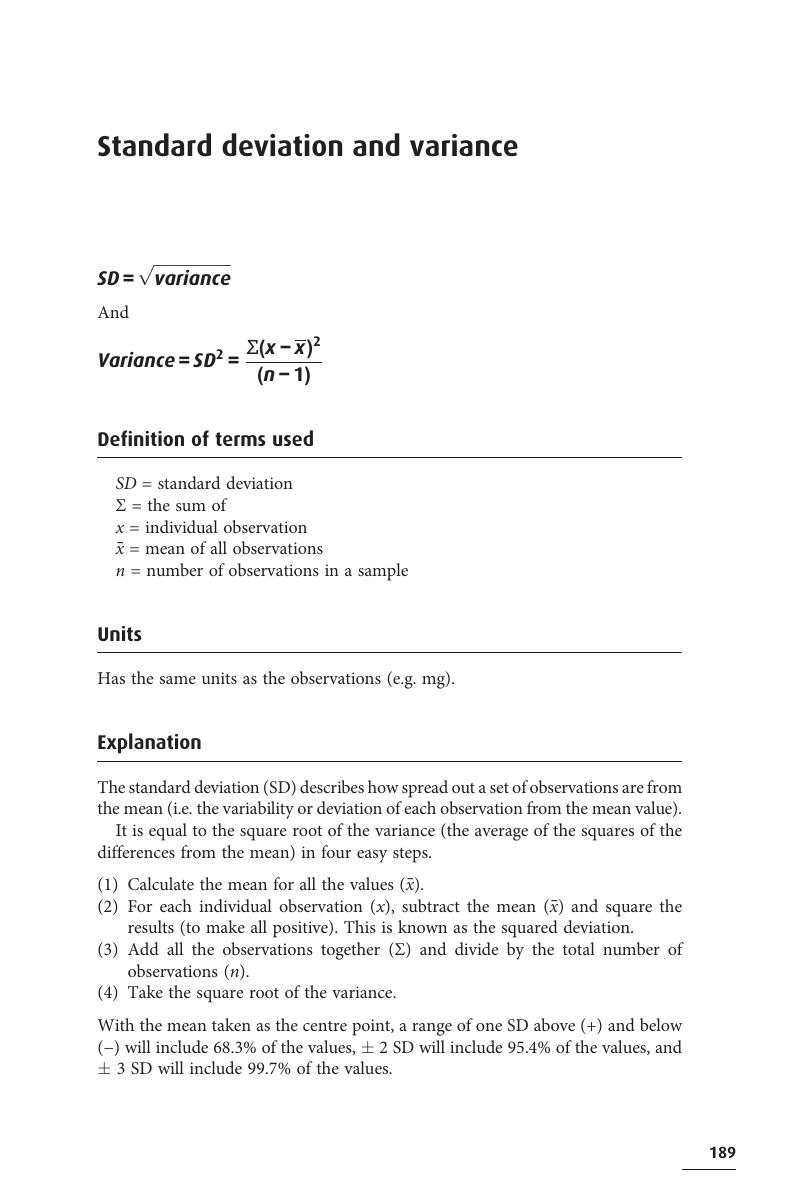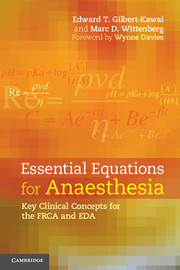Book contents
- Essential Equations for Anaesthesia
- Essential Equations for Anaesthesia
- Copyright page
- Dedication
- Contents
- Foreword
- Preface
- Acknowledgements
- Boyle’s law
- Charles’ law
- Gay-Lussac’s law (third gas law)
- Avogadro’s equation
- Universal gas equation
- Dalton’s law of partial pressures
- Henry’s law
- Graham’s law of diffusion
- Pressure and force
- Hagen–Poiseuille equation (and laminar flow)
- Reynold’s number (and turbulent flow)
- Laplace’s law and tension
- Bernoulli equation and Venturi effect
- Ohm’s law, voltage, current and resistance
- Capacitance and capacitors
- Inductance and inductors
- Work and power
- Transformers
- Electrical charge
- Doppler equation and effect
- Beer–Lambert law
- Relative humidity
- Natural frequency
- Wave equation and ultrasound
- Bioavailability
- Volume of distribution
- Clearance
- Hepatic clearance
- Concentration and elimination
- Plasma concentration and compartment models
- Loading dose and maintenance dose
- Exponential function and rate constant
- Half-life and context-sensitive half-life
- Time constant
- Rates of reaction
- Michaelis–Menten equation
- Drug–receptor dissociation constant and affinity
- Therapeutic index
- Cardiac output and cardiac index
- Stroke volume
- Ventricular stroke work and index
- Ejection fraction and fractional area change
- Coronary perfusion pressure and coronary blood flow
- Bazett’s formula – QT interval corrected
- The Fick principle – cardiac output measurement
- The Fick equation – oxygen uptake measurement
- Mean arterial pressure
- Venous return
- Total blood volume
- Systemic vascular resistance
- Uterine blood flow
- Stewart–Hamilton equation
- Oxygen delivery
- Oxygen extraction ratio
- Oxygen content equation
- The dilution principle – measurement of fluid compartment volume
- Diffusing capacity
- Compliance
- Bohr equation
- Alveolar ventilation equation
- Alveolar gas equation
- Helium dilution technique
- Spirometry: forced expiration
- Lung volumes and capacities
- Respiratory quotient and respiratory exchange ratio
- Shunt equation
- Pulmonary vascular resistance
- Renal filtration fraction
- Renal clearance and Cockcroft–Gault formula
- Starling’s equation – rate of filtration
- Fick’s law of diffusion
- Osmolality/osmolarity and the osmolar gap
- Morse equation and osmotic pressure
- Anion gap
- Goldman equation
- Gibbs–Donnan effect
- Nernst equation
- pH
- pKa
- Acid–base compensation simplified
- Henderson–Hasselbalch equation
- Cerebral perfusion pressure and intracranial pressure
- Intraocular pressure
- Binary classification tests and 2 × 2 tables
- Negative predictive value
- Positive predictive value
- Specificity
- Sensitivity
- Relative risk
- Relative risk reduction
- Absolute risk reduction
- Accuracy of test
- Chi-squared test
- Likelihood ratio
- Standard error of mean
- Standard deviation and variance
- Power
- Odds ratio
- Appendix 1 The International System of Units
- Appendix 2 Units of measurement
- Index
Standard deviation and variance
Published online by Cambridge University Press: 05 July 2014
- Essential Equations for Anaesthesia
- Essential Equations for Anaesthesia
- Copyright page
- Dedication
- Contents
- Foreword
- Preface
- Acknowledgements
- Boyle’s law
- Charles’ law
- Gay-Lussac’s law (third gas law)
- Avogadro’s equation
- Universal gas equation
- Dalton’s law of partial pressures
- Henry’s law
- Graham’s law of diffusion
- Pressure and force
- Hagen–Poiseuille equation (and laminar flow)
- Reynold’s number (and turbulent flow)
- Laplace’s law and tension
- Bernoulli equation and Venturi effect
- Ohm’s law, voltage, current and resistance
- Capacitance and capacitors
- Inductance and inductors
- Work and power
- Transformers
- Electrical charge
- Doppler equation and effect
- Beer–Lambert law
- Relative humidity
- Natural frequency
- Wave equation and ultrasound
- Bioavailability
- Volume of distribution
- Clearance
- Hepatic clearance
- Concentration and elimination
- Plasma concentration and compartment models
- Loading dose and maintenance dose
- Exponential function and rate constant
- Half-life and context-sensitive half-life
- Time constant
- Rates of reaction
- Michaelis–Menten equation
- Drug–receptor dissociation constant and affinity
- Therapeutic index
- Cardiac output and cardiac index
- Stroke volume
- Ventricular stroke work and index
- Ejection fraction and fractional area change
- Coronary perfusion pressure and coronary blood flow
- Bazett’s formula – QT interval corrected
- The Fick principle – cardiac output measurement
- The Fick equation – oxygen uptake measurement
- Mean arterial pressure
- Venous return
- Total blood volume
- Systemic vascular resistance
- Uterine blood flow
- Stewart–Hamilton equation
- Oxygen delivery
- Oxygen extraction ratio
- Oxygen content equation
- The dilution principle – measurement of fluid compartment volume
- Diffusing capacity
- Compliance
- Bohr equation
- Alveolar ventilation equation
- Alveolar gas equation
- Helium dilution technique
- Spirometry: forced expiration
- Lung volumes and capacities
- Respiratory quotient and respiratory exchange ratio
- Shunt equation
- Pulmonary vascular resistance
- Renal filtration fraction
- Renal clearance and Cockcroft–Gault formula
- Starling’s equation – rate of filtration
- Fick’s law of diffusion
- Osmolality/osmolarity and the osmolar gap
- Morse equation and osmotic pressure
- Anion gap
- Goldman equation
- Gibbs–Donnan effect
- Nernst equation
- pH
- pKa
- Acid–base compensation simplified
- Henderson–Hasselbalch equation
- Cerebral perfusion pressure and intracranial pressure
- Intraocular pressure
- Binary classification tests and 2 × 2 tables
- Negative predictive value
- Positive predictive value
- Specificity
- Sensitivity
- Relative risk
- Relative risk reduction
- Absolute risk reduction
- Accuracy of test
- Chi-squared test
- Likelihood ratio
- Standard error of mean
- Standard deviation and variance
- Power
- Odds ratio
- Appendix 1 The International System of Units
- Appendix 2 Units of measurement
- Index
Summary

- Type
- Chapter
- Information
- Essential Equations for AnaesthesiaKey Clinical Concepts for the FRCA and EDA, pp. 189 - 190Publisher: Cambridge University PressPrint publication year: 2014

